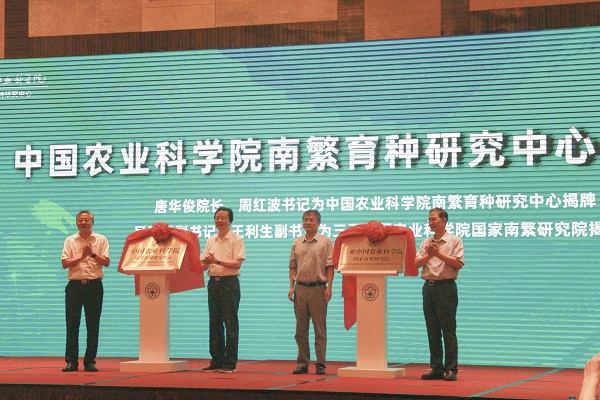
CAAS President Tang Huajun (second from left), and Zhou Hongbo (left), member of the Standing Committee of CPC Hainan Committee, unveil the CAAS's Nanfan Breeding Research Center on Wednesday at the inauguration ceremony in Sanya, Hainan province. [Photo by Zhao Yimeng/chinadaily.com.cn]
The Nanfan Breeding Research Center under the Chinese Academy of Agricultural Sciences was unveiled on Wednesday in Sanya, South China's Hainan province, marking the arrival of the first national institute within the Nanfan seed breeding base.
The center will engage in research on the protection and utilization of seed germ plasm resources, molecular design and variety cultivation.
Tang Huajun, president of CAAS, said the debut of the new center will integrate the academy's resources at the Nanfan breeding base, resolving key technical problems in the seed industry.
"The center aims to transfer the research pattern from fighting alone to working together; from fields to laboratories; and from seasonal experiments to round-the-clock study," said Tang, also a Chinese Academy of Engineering academician, at the inauguration ceremony for the new center.
The center will be jointly operated with CAAS's Nanfan Institute, which was registered in the Sanya Yazhou Bay Science and Technology City in October 2019 to boost innovation in the seed industry and ensure national food security.
Since the Institute was registered, projects for establishing national seed innovation labs and high-level biosafety labs have been admitted by the provincial government.
A total of 9.86 million yuan ($1.53 million) has been invested in six research projects while 88 experts will settle in the institute. The first batch of 26 postgraduate students will be enrolled in September this year, the academy said.
Nanfan Scientific and Research Breeding Base, dubbed China's Silicon Valley of agriculture, is home to more than 70 percent of new crop varieties in the country, according to the provincial government.
"We hope to build the Nanfan Silicon Valley into an international center for the seed industry," Tang said.
Nanfan, or seed breeding in South China, started in 1950s as agricultural scientists came to Hainan from September to May to conduct breeding-related activities. Shortening the breeding cycle by half or more, Nanfan can accelerate the breeding process and greatly improve the adaptability of varieties.
Located in the Yazhou Bay area, the breeding base takes advantage of the tropical climate and biological resources in Hainan and has attracted 8,000 scientists and workers from 700 research institutions and universities to settle in this vital seed propagation center, including Yuan Longping, the father of hybrid rice.
CAAS has 11 institutions and bases at the Nanfan breeding base, covering an area of 133 hectares. More than 80 percent of the academy's crop varieties were bred at facilities in Nanfan breeding base, including a wild cotton germ plasm resource nursery and a trail field of crop sciences.
The 2021 China Seed Congress and the Nanfan Agricultural Silicon Valley Forum held in Sanya in Hainan province on Sat...
Over 100 experts from across the world are due to attend the 2021 China Seed Congress and the Nanfan Agricultural Sil...
The Hainan delegation to the ongoing fourth session of the 13th National People's Congress has put forward a proposal...